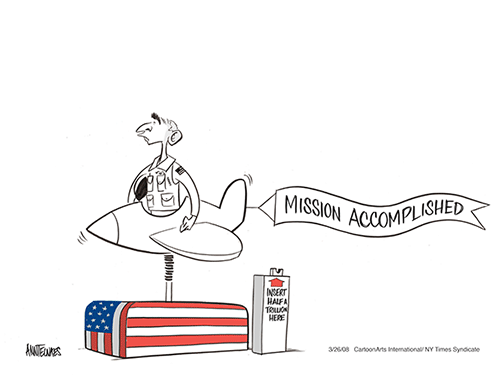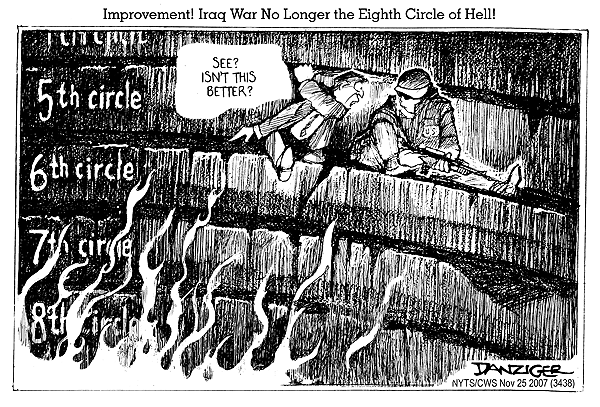There are really two debates going on about the Iraq war, but only one of them is being heard at the present time. Was the decision to invade a mistake from the beginning? For the most part, Democrats say yes and Republicans say no. The other debate centers on the invasion's aftermath. Is the current debacle the result not of the decision to overthrow Saddam Hussein but of the inept policies that followed? Since this question suggests that success in Iraq was always a possibility, it is generally being ignored both by Democrats, who don't want to muddy their antiwar position, and by Republicans, unwilling to face up to the Bush administration's serial failings.
Charles Ferguson's 2007 documentary, "No End in Sight," was unusual because it focused on this second question. It was a powerful and heartbreaking film. Ferguson introduced us to well-intentioned, intelligent people who took the White House at its word and went to Iraq to build a decent postwar society. He showed how they had their legs cut out from under them every step of the way by arrogant ideologues in Washington. Now he has taken the material he collected from more than 50 interviews, expanded and updated it with additional interviews, added his own interpolated commentary and a charming introduction, and produced a book also titled "No End in Sight" that, in its way, is as powerful as his movie, and equally heartbreaking.
With the leisure that a book affords, a reader comes to understand why both versions of "No End in Sight" work so well. Ferguson is an expert interviewer — smart, attentive, persistent. He does his homework before he sits down with a subject so that he can ask the right questions. Most important, he is no partisan (he was an ambivalent supporter of the war). Ferguson is genuinely interested in getting at the truth. He wants to know exactly what went wrong.
Many of the top figures — L. Paul Bremer, Donald Rumsfeld, Colin Powell, Paul Wolfowitz — refused to talk to him, but Ferguson still managed to gather a comprehensive cross section of policy makers, bureaucrats, journalists, field operatives and foot soldiers, not to mention Iraqis. Here is A. Heather Coyne, who spent 15 months in Iraq as a civil affairs officer with the Army. Coyne, who knew Arabic, went to Iraq "on a high because we really believed in what we were doing." Then she watched as everything went wrong. When she wanted to print up documents to promote a street-cleaning program, she was told: "That's a great idea. But we don't have any ability to print certificates" — which summed up for her all the failures of the American effort. "I still believe that this could have worked," she says. "If you'd really had the capability, and the materials, and the relationships, and the expertise, and the trained staff, and the equipment, and everything else you needed."
Here, too, is Barbara Bodine, a career Foreign Service officer and former ambassador to Yemen, charged with overseeing the administration of Baghdad during the first few months of the occupation. She arrived after the looting had begun and found no personnel, no desks, no telephones. "We didn't know who to call; we didn't know where to go. I was responsible, for example, for Baghdad City. It wasn't even clear to us where the mayoralty was." Bodine had originally opposed the war, but she too believes that with the right planning, the occupation could have succeeded.
"No End in Sight" reads like a primer on incompetence, a catalog of bungling. "There were 500 ways to do it wrong, and two or three ways to do it right," Bodine tells Ferguson. "What we didn't understand is that we were gonna go through all 500."
Doing it wrong started with the looting. This wasn't a matter of thieves walking off with toasters and television sets. What happened in Baghdad was of an entirely different magnitude, a descent into nihilism that lasted for weeks, even months. Stores, schools, hospitals were destroyed; at least 16 of 23 government ministries were gutted. Organized criminals brought in industrial cranes to haul off parts of a power plant. Yet the instructions from Washington were not to interfere. "Freedom's untidy," Rumsfeld intoned. The result was a loss of Iraqi trust that has never been regained.
The worst mistake, however, was the disbanding of the Iraqi Army in May 2003, two months after the invasion. This was a decision made by only a few men — specifically Bremer in his capacity as the head of the occupation authority, and his aide Walter Slocombe — and against the advice of just about everyone with any on-the-ground knowledge of the situation. (According to Ferguson, it's unclear if President Bush approved of the idea.) Bremer and Slocombe apparently believed that the Iraqi Army had to be rendered powerless, though others explain to Ferguson that Bremer and Slocombe were confusing the army with the Republican Guard. The Guard consisted of Baath Party loyalists; the Iraqi military was a professional force that had always tried to keep its distance from the Hussein regime. When the war began, the army had faded into the countryside, leaving the Guard to do the bulk of the fighting. Once the Americans prevailed, according to Lawrence Wilkerson, Colin Powell's chief of staff, Iraqi military officers indicated their willingness to work with the occupiers, but instead they and their troops were stripped of their positions and careers. An estimated 500,000 to 800,000 men, 7 to 10 percent of the Iraqi work force, lost their jobs. And they had guns. "More than any other single action," Ferguson says, the order to disband the army "created the Iraqi insurgency."
And so it went — through the appointment of the White House's political cronies rather than experienced technocrats; through the continued shortage of men and resources; through the contradictory policies and ever more desperate improvisations; through the amateurish inefficiencies and absolutely astounding levels of corruption; through ethnic cleansings and wanton killings and terrorist bombs — down to 2007 and the start of the surge. Ferguson's final, and most timely, section moves beyond his film, and takes as its title the question everyone is left asking: "Where Do We Go From Here?"
Ferguson doesn't have an answer, but he supplies the kind of essential information his readers will need to come up with one. For example, most of his interviewees, American and Iraqi alike, are satisfied that the surge has worked to reduce violence in the short term, but are skeptical about the long term. The underlying structural divisions threatening to tear Iraq apart are still in place, and in some instances may have gotten worse. The Iraqi office manager for The Washington Post explains that the insurgents have lowered their level of fighting but are simply waiting for the Americans to leave. Ferguson's Kurdish bodyguard tells him the United States has actually weakened the central government by working with local Sunni militias that feel no allegiance beyond their particular tribes and neighborhoods. "They don't care about the government. And the government, they don't have any power over what's going on." Another informant says Washington has been "promoting warlordism." Ferguson reports the "stunningly unanimous opinion" among his interviewees "that the surge is producing no lasting military or security benefit whatsoever."
And if the Americans withdraw? Most of the people Ferguson talked to believe the result would be full-scale civil war; one analyst speaks of three or four civil wars at once. Even some of those who favor withdrawal accept the likelihood of a blood bath. "You would see the Sunnis of Baghdad certainly getting finished off quick," says one. Another, an American specialist on democracy and development obviously wearied by Iraq, says the mere threat of withdrawal might bring the rival factions together, but if not, "they can have their civil war."
It's not that simple, however. A bloody civil war, several experts observe, probably would not be limited to Iraq. Neighboring countries would almost inevitably be drawn in, and the entire region could be engulfed in chaos. Iran would support the Shiites, while Saudi Arabia, Jordan and possibly Egypt would back the Sunnis. Turkey, meanwhile, might become more deeply enmeshed in Iraq's Kurdish areas. Juan Cole, a historian at the University of Michigan, was an influential opponent of the war who now opposes a pullout. He's not the only one. Cole points out that a proxy war between Iran and Saudi Arabia could endanger the world's oil supplies. "Iraq is not like Vietnam, where the U.S. could withdraw precipitately and altogether and let the chips fall where they may. ... The U.S. has destabilized the cockpit of the world economy. The plane is now spiraling down."
Yet those urging a continued American presence are short on solutions for the long term. Partition claims few adherents, not only because most Iraqis oppose it — Iraq's United Nations ambassador for part of 2007 says, "Nobody in Iraq is fighting to partition the country" — but also because Iraq's neighbors worry how partition would be received by their own restless minorities. A regional conference including Iran and Syria has its supporters, though none who are convinced it would accomplish very much. Muddling through with an ineffectual government that wins the confidence of no one is the best that some of the interviewees can come up with, but without a coherent plan for creating a viable central authority, this is a policy that truly has "no end in sight." John McCain's comment that the United States could be in Iraq for 100 years is mudling through's reductio ad absurdum.
Many Iraqis favor a military coup. An Iraqi journalist says, "Going back to the dictatorship definitely would help," and this view, Ferguson writes, "is surprisingly popular among educated, secular Iraqis." It's easy to understand why. Since 1920, when it was created, the Iraqi Army has been a national, nonsectarian institution with a broad degree of popular support. Armies in the region have often played a stabilizing and modernizing role, as the next-door example of Turkey demonstrates. The real question is whether the army could be reconstituted in anything like its traditional form.
Abetting a coup against an elected government is no one's idea of a happy ending. According to one Iraqi sympathetic to the coup suggestion, it would constitute a second American invasion, only from the inside. But as the former United Nations ambassador explains to Ferguson, "If you are a military officer looking at this political class unable to make basic decisions ... the temptation must be great to think you can't do it any worse."




